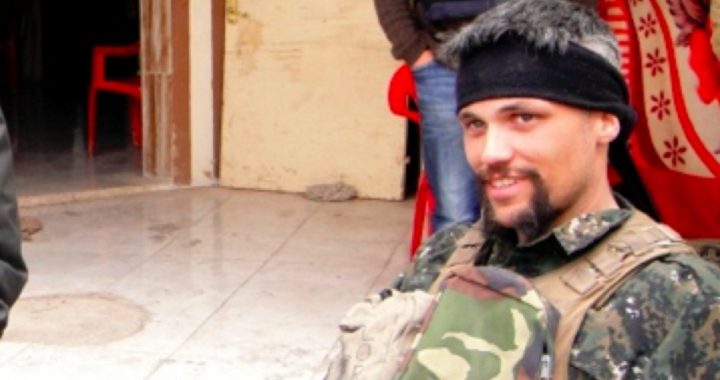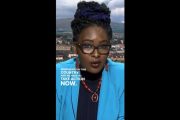
You might have heard about those people hailing from Western countries going off to fight where ISIS reigns.
Or maybe not.
No, these aren’t the jihadists who speak flawless French or English and leave the comfort of their Occidental cocoon to aid the Islamic State terrorists. Rather, they’re driven by a desire to be defenders of the innocent who, like Lawrence of Arabia fighting the last great caliphate (the Ottomans) a century ago, are waging war against a savage force aiming to be the next great caliphate.
Twenty-eight-year-old Jordan Matson (shown) is a long way from his home town of Sturtevant, Wisconsin. Sporting a tactical vest bearing the words “Christ is Lord,” the ex-US Army serviceman is now in Iraq helping the Syria-based Kurdish “Popular Protection Units” (YPG) in their fight against ISIS. And he’s determined to prevail. Writes Haaretz:
“I’m not going back until the fight is finished and ISIS is crippled,” Matson told The Associated Press…. “I decided that if my government wasn’t going to do anything to help this country, especially Kurdish people who stood by us for 10 years and helped us out while we were in this country, then I was going to do something.”
Matson and dozens of other Westerners now fight with the Kurds.
Yet many of these Westerners, disenchanted with YPG’s left-wing nature, are joining a different anti-ISIS resistance group: a Christian militia. It’s called “Dwekh Nawsha,” which, as World Bulletin explains, means “self-sacrifice in the ancient Aramaic language spoken by Christ and still used by Assyrian Christians, who consider themselves the indigenous people of Iraq…. Dwekh Nawsha operates alongside Kurdish peshmerga forces to protect Christian villages on the frontline in Nineveh province.”
One Dwekh Nawsha recruit is a seven-year US army veteran named Scott who said he’d planned on joining YPG “until he found out they were ‘a bunch of damn Reds’,” wrote the Daily Mail Wednesday. The paper continued:
Other foreigners in Dwekh Nawsha say they were turned off by what they see as the socialist streak in the YPG, an affiliate of Turkey’s Kurdistan Workers’ Party whose months-long battle against ISIS in Kobane attracted many volunteers.
Alan Duncan, a prominent British foreign fighter and veteran of the Royal Irish Regiment, recently left the YPG for similar reasons.
He told AFP that an exodus of foreign fighters from the YPG has begun, naming several well-known volunteers currently fighting for the group he says plan to leave in the coming days.
This is no surprise. As The New American reported last month, even Vice President Joe Biden admitted that the Muslim rebels the US had been supporting in Syria were anything but “moderate.” In fact, some critics point out that the Obama administration policy of facilitating the misnamed “Arab Spring” revolt against more secular Mideast dictators has helped create the ISIS monster. These critics can only hope that in Dwekh Nawsha, Westerners fighting unofficially have found some “good guys” where Western officials couldn’t.
Whatever the case, there seems no doubt that the modern-day Lawrences are good guys. And one of them is a Dwekh Nawsha fighter known only as “Brett,” another 28-year-old ex-US Army veteran. As ambitious as he is brave, he also acts as a recruiter, saying “he wants to establish a ‘foreign fighters’ battalion’,” writes World Bulletin. The site continues, “In his first week in charge, he brought in five volunteers from the United States, Britain and Canada, all of whom he says have military or contracting experience.”
Brett is also nothing if not colorful. He “describes himself as a ‘crusader’ with a tattoo of Jesus with a crown of thorns on one arm and a machine gun on the other,” the Daily Mail tells us. And Reuters adds to the picture, reporting that he considers his current battle “a biblical war between good and evil” and writing:
Brett … carries the same thumb-worn pocket Bible he did whilst deployed to Iraq in 2006 — a picture of the Virgin Mary tucked inside its pages and his favorite verses highlighted.
“It’s very different,” he said, asked how the experiences compared. “Here I’m fighting for a people and for a faith, and the enemy is much bigger and more brutal.”
And crusader is an apt characterization. The First Crusade in 1096 was launched as a response to more than 400 years of Islamic jihad that had already seen the conquest of two-thirds of the old Christian world, and was at that point pushing toward the back door of Europe. And now, just as Muslim armies overran the Christian Mideast and North Africa in the seventh and eighth centuries, today’s jihadists are ravaging the same lands and are now situated a mere 109 miles from Italian soil.
Another crusader joining Dwekh Nawsha is Australian citizen Khamis Gewargis Khamis. Although it’s illegal under Australian law to take up arms with the militia, so devoted is Khamis that he’s willing to suffer the consequences. And others are already suffering, as Vanity Fair’s James Harkin reports recounting a visit to a makeshift hospital in the northern Iraqi city of Sinjar. He tells us about some patients he met:
One of them was an amiable 37-year-old U.S. army veteran who told me his name was Patrick. I asked him why he’d come to fight, and he pulled something straight from the playbook of American evangelical Christianity. “I have selfish reasons”, he said. “Back home I found no purpose or meaning in life, so I prayed. America is different, you know; it’s just money. So I prayed for a purpose and meaning in my life. Here I find myself — I don’t know how else to explain it — finding purpose and meaning in helping these people to overcome Daesh [a local name for ISIS].” He had arrived in Iraq two weeks earlier, on January 3, he said; his comrade, another American army veteran who had arrived a month earlier, was lying beside him on a stretcher alongside an Australian. While Patrick was unhurt, both the Australian and the other American had been lightly wounded by a mortar that, according to the Australian, “landed in our faces.” Both the Americans had taken local names, derived from the names of Kurdish mountains. “The Kurds are a mountain people”, Patrick explained. His nom de guerre was Bagok, while his comrade had chosen Judy. “Judy’s a girl’s name,” I said. “Not around here,” said Judy.
But then there are the unlikely crusaders. One of them is Dean Parker, a surfing granddad with no fighting experience who, adding to his eccentricity, left his surfing-instructor job in Costa Rica and headed for Syria. His family didn’t even learn of his decision until he was in the field, at which point the 49-year-old informed them via Facebook that he’d heard “God’s call.” Haaretz provides more details about his motivations:
[Parker] told the Mail that his decision was prompted by a TV report about the plight of the Yazidis, trapped by ISIS fighters on Mount Sinjar in Iraq.
“The cameraman filmed this one mother holding her 10- or 11-year-old son. She was crying, holding him,” he told the Mail. “He was looking at the camera and that look of sheer terror in his eyes overwhelmed me with emotions I have never felt before.”
Yet as with the First Crusade in 1096, these crusaders may face long odds. Dwekh Nawsha gets no aid from the Iraqi central or Kurdistan governments, so it’s short on salaries, weapons, and other supplies. And whatever the militia fighting ISIS, it will face a force that presently seems almost as unstoppable as it is savage. Yet with God, these devoted men might say, all things are possible. So for now, it will be onward Christian soldiers.
Photo of Jordan Matson: AP Images



